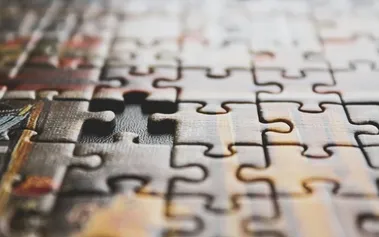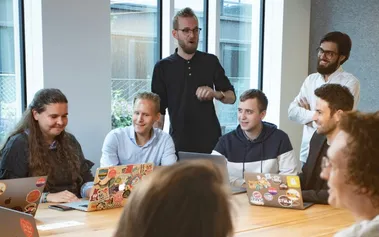You've probably been in this situation before. You're sitting in a meeting where someone makes an offhand comment about a female colleague's "communication style" or suggests that diversity hiring means "lowering standards." You know it's wrong. You feel uncomfortable. But you say nothing.
Later, you might share an article about women in tech on LinkedIn or attend a DEI workshop. You consider yourself an ally, and your intentions are genuinely good. But here's the uncomfortable truth I've learned through years of DEI work: awareness without action isn't allyship. It's just well-meaning bystander behaviour.
That's why my co-organiser Lanre Owolabi and I are launching the Male Allyship Program as a community programme within the European Women's Payments Network (EWPN). We're moving beyond individual good intentions to create a structured community where male allies can develop the skills, accountability, and support systems needed to drive real change for women in tech.
Why Individual Efforts Fall Short
The Awareness Trap
For too long, male allyship in tech has been an individual pursuit. Men read a few articles, maybe attend a workshop, then go back to their daily routines hoping they'll somehow recognise and act on opportunities to support their female colleagues. The problem is that without community, accountability, and ongoing development, most of us default back to passive awareness.
I've seen this pattern repeatedly throughout my 25 years in engineering leadership. Well-meaning managers who intellectually understand bias but still interrupt women in meetings. Technical leads who recognise the gender pay gap but never advocate for female team members during promotion discussions. Senior engineers who know about impostor syndrome but fail to sponsor junior women developers.
Industry Challenges
The payments and fintech sector faces particular challenges. It's a traditionally male-dominated industry with deeply embedded cultural norms that can be difficult to challenge individually. When I started collaborating with the EWPN, it became clear that sporadic, uncoordinated allyship efforts weren't moving the needle on systemic issues.
Research from organisations like Catalyst consistently shows that when men work together with clear frameworks and mutual accountability, their impact on gender equity increases exponentially. Individual allies might influence their immediate team, but organised allies can shift entire organisational cultures.
The Three Pillars Framework
The Male Allyship Program isn't another awareness initiative. Lanre and I are creating a practical community focused on developing tangible skills and creating measurable impact for women in tech. As a community programme within the EWPN, we're addressing real challenges identified by women themselves, not what we assume they need.
Amplification Skills
We're building capabilities to elevate women's voices, ideas, and contributions without centering ourselves in the process. This means understanding when to speak up, how to redirect credit appropriately, and recognising the difference between helping and mansplaining.
Effective amplification requires learning when your voice adds value and when it takes up space. It means practising phrases like "As Sarah mentioned earlier" instead of repeating ideas as if they were your own. It involves understanding meeting dynamics and knowing how to create space for women colleagues to contribute.
Advocacy Capabilities
Participants learn to identify and interrupt bias in hiring, promotion, and project allocation decisions. We practice having difficult conversations with other men about problematic behaviour. Most importantly, we explore how to use our privilege and influence strategically to create opportunities for women colleagues.
This isn't about being the hero who rescues women from discrimination. It's about understanding systems of power and using your position within those systems to create change. That might mean questioning why your team's hiring pipeline consistently lacks diverse candidates, or speaking up when promotion criteria seem to favour traits more commonly displayed by men.
Systemic Thinking
Individual acts of allyship matter, but sustainable change requires understanding how organisational structures, processes, and cultures perpetuate inequality. We examine everything from meeting dynamics to performance review criteria, looking for leverage points where coordinated action can drive broader transformation.
Systemic thinking means moving beyond individual behaviours to examine policies and practices. Why do your company's "culture fit" interviews seem to favour candidates who look like current leadership? How do informal mentoring relationships form, and who gets excluded? These are the questions that lead to structural change.
How Community Creates Change
Practical Structure
The community operates through monthly workshops, peer mentoring circles, and collaborative action projects. Unlike traditional training programmes, we maintain ongoing accountability partnerships where members support each other in applying new skills and addressing real workplace challenges.
What makes this different from other allyship initiatives is our commitment to measurement and transparency. We track specific outcomes (not just participation metrics) and regularly share progress with the broader EWPN community. This isn't about feeling good. It's about creating demonstrable change.
Skills Development
Effective male allyship requires developing capabilities that most of us were never taught. We need to learn how to listen deeply without immediately jumping to solutions. We must understand how to share power rather than simply offering support from positions of authority. Perhaps most challenging, we need to become comfortable with being uncomfortable as we confront our own biases and blind spots.
We also address the emotional labour aspect of allyship. Many men want to support gender equity but expect women colleagues to guide their efforts. The programme helps participants develop independent judgement about when and how to act, reducing the burden on women to educate and direct male allies.
Community support proves essential for this development. Changing ingrained behaviours and challenging systems requires ongoing encouragement and accountability. When you're the only person in your organisation trying to shift problematic dynamics, it's easy to get discouraged or revert to old patterns. Having a network of men working towards similar goals provides both practical advice and emotional resilience.
Ready for Real Commitment
Who Should Join
This programme isn't for everyone, and that's intentional. We're looking for men in tech who've moved beyond basic awareness and are ready to commit to ongoing action. If you're still questioning whether gender bias exists in technology, this probably isn't the right fit yet.
Ideal participants are engineering managers, technical leads, senior developers, and other men with influence in their organisations who want to use that influence constructively. You might be someone who's tried individual allyship efforts but struggled to create lasting impact. Perhaps you've seen talented women colleagues leave your company and want to understand how to prevent that pattern.
The programme requires genuine commitment. Participants attend monthly workshops, engage in peer mentoring relationships, and commit to implementing at least one systemic change initiative in their workplace within six months. This isn't passive participation. We expect members to practise new skills, share challenges openly, and hold each other accountable for progress.
Expected Outcomes
In return, you'll develop practical capabilities that make you more effective in advancing gender equity. You'll build relationships with other committed allies across the industry. Most importantly, you'll contribute to creating workplaces where talented women can thrive without constantly battling systemic barriers.
We're also realistic about the challenges involved. This work can be professionally risky when it involves challenging senior colleagues or established processes. The community provides guidance on navigating these situations strategically and support when things don't go as planned.
Time to Act
The Male Allyship Program represents our belief that meaningful change happens through coordinated action, not individual goodwill. By working together with clear frameworks, mutual accountability, and ongoing support, we can create the kind of systemic shifts that isolated allies struggle to achieve.
Lanre and I are committed to building a community that moves beyond performative allyship to create measurable impact for women in tech. As a community programme within the EWPN, we're contributing to broader industry transformation while addressing the specific challenges women face in our sector.
If you're ready to move from awareness to action, we'd welcome your participation. The program launches in the coming months, and we're currently accepting expressions of interest from committed allies.
To join or learn more, connect with me on LinkedIn or reach out to Lanre Owolabi. Together, we can build the supportive, accountable community that effective male allyship requires.
The women in our industry have been advocating for change for decades. It's time for men to step up with organised, sustained action.




